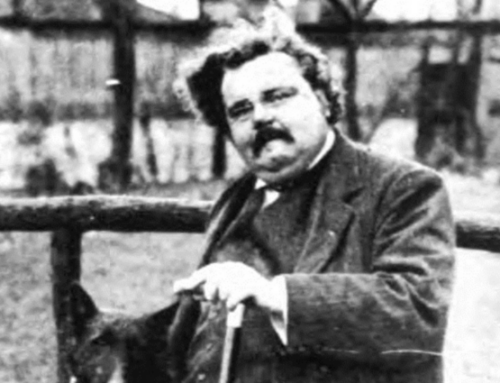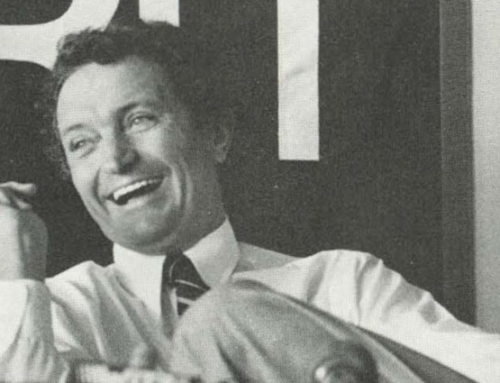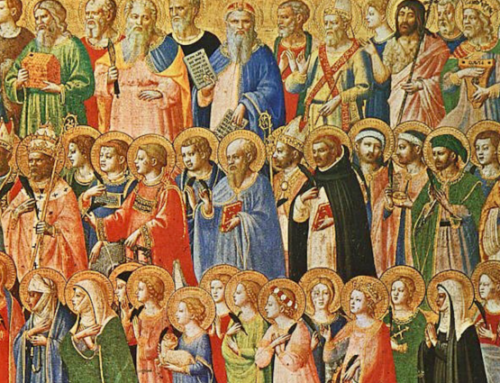My mother’s life was too short. She loved Jesus and wanted to be like Him in every way. She understood the power that is inherent in holiness, even in weakness. And, ordinary woman that she was, she took part in that power. She spent time every day in the Scriptures because she believed that Jesus was speaking to her and telling her what to do. And she wanted to do that.
“Turn that off. You’re making Dad cry.” My nine-year-old son and seven-year-old daughter had found a DVD with footage of my mother and my oldest son, then a baby of one, and were playing it. My twelve-year-old had heard me crying and was giving orders. I hadn’t even been in the room when it started, but hearing the voice again tore my heart open. Anytime I think that, after all this time, I have forgotten her or that my grief is at an end, all it takes is a picture or a recording of her voice and I become undone. She died twenty years ago today. I have never stopped grieving. Nor do I believe I ever will until I see her again, God willing, in the company of the saints, with whom I believe she belongs.
Karen May Sowers Deavel died twenty years ago today. She was born on August 17, 1939, the youngest child of Victor O. Sowers, Sr., and Dollie Marie Holland Sowers. The youngest of eight children (two were half-siblings from my grandfather’s first marriage), she was the beloved baby in every respect. Born when my grandmother was 41 in the little house next to the LaPaz, Indiana, school, her closest sibling was her sister Myrna, five years older. Her oldest half-sister, Margaret, was born in 1917. Her five older brothers (born between 1918 and 1927) were either out of school, or almost out of school, by the time she had memories. She loved them all but had a special affection for her brother Everett, who had a heart for the wounded. He was famous for telling his mother that what he wanted to do for people was leave gifts for them and not let them know. He and the others would all enter the military by the end of World War II, and several saw combat. (Lowell, born in 1927, lied about his age to get in before the end.) She recalled repeating over and over, “I hate Hit-er.” Though she was not quite able to say the German dictator’s name, she knew that he had taken away her beloved brothers.
They loved her, too. Nobody has ever quite explained how or why it happened, but when her brother Victor, Jr., on leave from the Army Air Corps, married Aunt France, little Karen ended up going on the honeymoon with them. Years later when my mom married my dad, she emerged from the wedding reception to find Aunt France in the back seat of the bridal vehicle. “You went with me on mine; I’m going with you on yours,” she said. (She didn’t, actually.)
All the brothers survived World War II, a blessing indeed. Karen’s life was idyllic, going to school next door and coming home for lunch with her mother. She was bright, but perhaps it was a gift for prophecy that was most astonishing. At age six, she was sitting in her grandmother’s house with her mother and grandmother while a local thirteen-year-old boy mowed the lawn. Looking out the window she exclaimed, “I’m going to marry that boy someday.” The older women laughed. Little did they know.
A year or two later, Victor, Sr., employed by the Pennsylvania Railroad as a ticket agent, was transferred to Van Wert, Ohio, two hours east of them. A good student, Karen did well in most of her subjects, including Latin—still taught in public schools in the 1950s—and choir and band, which still taught the classical music tradition. She was indeed one of those band kids, but perhaps such cliques hadn’t hardened in her day, for she also loved both to watch and to play sports.
Van Wert High School had several years of undefeated football teams. Her future brother-in-law, Willie Hernandez, was an all-state player who, at the state all-star game, became friends with Len Dawson, who would go on to lead the Kansas City Chiefs to their first Super Bowl victory and be voted into the NFL Hall of Fame. One of her classmates, Larry Smith, became a college coach who had stints at Arizona State and USC. (He got us tickets at least once when Notre Dame played USC.) Girls in those days played intramural sports, and her favorite was basketball, which was played six-on-six, with half the team assigned to defense and half to offense.
Before high school she had a conversion experience and was baptized at the age of twelve at Van Wert’s First Baptist Church. She took her faith seriously, starting a lifetime habit of taking time each day to “be in the Word,” as Evangelicals describe the reading of Scripture. Her “life verse,” so far as I can tell, had to have been 2 Timothy 3:5: “Having a form of godliness, but denying the power thereof: from such turn away” (KJV). Though like most Evangelicals she had a theoretical affirmation that “faith alone” was required for salvation, she understood all too well that moral disobedience of God and faith were connected. I never quite puzzled out where she was in the once-saved-always-saved debates, but her worries about ungodliness were perhaps hints. In high school, she was horrified when one young man once claimed to have taken liberties with her on a date.
After graduation, she worked at a bank and continued to live with her parents in Van Wert. She was active in her church, not only teaching Sunday school but singing in the choir, occasionally playing the piano, and often doing “special music” as part of a trio with her sister Myrna and one of her best friends, Shirley Fast. (We called her Aunt Shirley as kids.) She loved her parents dearly.
She babysat for her many nieces and nephews who lived close by and sometimes traveled with them. When her nephew Mike was in the Army, she traveled with him and his parents, Vic and France, around Europe. In Switzerland, she bought a cuckoo clock that I always found fascinating as a child. And she looked for a husband.
I’ve always been puzzled as to why she didn’t get married earlier. She was about five-foot-three, trim, with a bust and pretty legs. She was proud of her slender ankles. She was positive, she was kind, and she loved to laugh. Perhaps it was her high spiritual standards.
Whatever the reason, she was still single in her early thirties when her cousin Paul Ingerham called her in early 1972 to ask if she would be interested in going out on a date with Phil Deavel. My father had been married for about a decade and had two young daughters, one eight years old and one eighteen months old, when a drunk driver rear-ended the family while driving close to one hundred miles per hour. His wife and daughters had been killed. He had survived, awakening in the hospital over a week later to the news that he was the only survivor and the funerals were over. After a few months of surviving on canned soup, hot dogs, and prayer, he had decided to ask Paul, his high school classmate, whether Karen Sowers was still single.
At first, thinking my dad was confused—he had gone out on a few dates with Aunt Myrna years before—Paul told him no. But when Dad assured him that he knew which sister he was talking about, Paul made the call. For their first date, they met in Columbia City, Indiana, about halfway between Lakeville, Indiana, where he was living, and Van Wert. They hit it off immediately and were engaged within a month and a half. Her father would die before the wedding, but my dad was able to ask him for his daughter’s hand in marriage. The laconic reply was, “Well, Phil, I haven’t got anything against you.”
Did I mention that Phil was the thirteen-year-old mowing her grandparents’ lawn?
Uncle Everett walked her down the aisle. Aunt France threatened honeymoon accompaniment. And Mom settled down with Dad in Lakeville, only a few miles from where she was born. “Near the corner of 6 and 31,” she would say of the intersection of a U. S. highway and a state route that served as a marker for our area. “How did I get back here?” But though she missed her friends in Van Wert, much of our family lived close by. For her, family was not a competitor to the love of God in Christ; it was the place where that love was practiced.
Indeed, she wanted her own family. Unlike some people from large families, she loved having those brothers and sisters and wanted to have at least six children of her own. Frustratingly, it took nearly three years for the first-born, me, to arrive. And another three years and four months till my brother, Dan, came. After that, no more children. But she always believed that God’s will was best, even though it didn’t necessarily match up with our wishes.
Until I was born, she worked in an H & R Block office doing taxes. She quit, but like many stay-at-home mothers, she supplemented my dad’s factory income by babysitting other kids, doing taxes for people independently, and taking other gig-type jobs. She had waited for her babies and was not about to miss their early years. She had worked “outside the home” already. Her real work was always, she believed, raising her kids—which included making us know our family, studying, playing, and knowing the Lord.
I’ll always be grateful that she did teach us to know our family. Unlike many other kids, we went to all the family reunions, visited our elderly relatives, and even went to funerals. Given that my mom and dad were both older when I was born and the youngest children in their families, we had a lot of older relatives and a lot of funerals. These people were important and we were to know them and pray for them. She was herself a kind of central figure in her family, passing on news and helping organize the reunions. She taught us that family involved duty just as did every part of our lives.
Schoolwork and learning to use our bodies were also duties, since God had given us good minds and we were to use them for his glory. Though I was a good student, I didn’t always want to do the work. Since my early math scores were not where they should be, she would make up worksheets for me to do and then time them. Since I was reticent about things that didn’t come that easy to me, she told me after a few bike crashes that I wouldn’t be able to watch cartoons until I mastered riding my bike. The latter task took me the course of an afternoon after the threat. Her repeated refrain was that we could do anything we set our mind to—within reason, of course.
What was most important, however, was her teaching us to trust God. We never missed Sunday school or Sunday services, morning and evening. When I was four we started attending the South Bend Christian Reformed Church, a Dutch Calvinist denomination that was less focused on getting saved and more on knowing all of Scripture and learning how to live. She made sure my brother and I were paying attention, and if we had memory work for Sunday school, she made sure we had memorized it. She also made sure we were paying attention once we were out of the nursery and in church, though at Sunday night services she let us read books when we were younger. She had a sense of reality.
She also had a sense that she was to be Christ’s presence everywhere she went. When my brother started school, she went to work in the lunchroom at Bremen Elementary School, where we were going, having moved the eight miles from Lakeville to be in a better school system. Like many women, she wanted to work in a place where the hours allowed her to be home when we were home. Being at school, she was also where we were. When I was in high school, she got the job (I don’t know what the title was) running the brand-new copier for the high school. She always kept candy in a dish at her desk and she was always ready to talk to, pray with, or hug anybody who came in—students, staff, or teachers. There were very few who ever disliked her, though sometimes people were angry.
At one point after I graduated, one of the other staff members at school who had been a friend to her was angry that my mom had received a new job doing financial work in the school. Convinced that my mom had betrayed her, she spoke about her only behind the back. Mom was very hurt by this but prayed for her and kept on. She believed that she had to be like Christ, who also suffered from unfair treatment. Several years later, this woman apologized to Mom for her behavior and acknowledged that she had done nothing wrong. Mom embraced her again.
She could be angry herself. I think the only time she ever swore was at me—she said “damn.” But then again, I can be pretty infuriating. I think the most angry she was at my father was when he, without consulting her, purchased cemetery plots in the Fair Cemetery near LaPaz. Though she knew her eternal home was most important, the idea that he would make a decision like this without her made her very angry. She eventually got over it when she realized that my father, whose own father had left the family when he was five, wanted to be in the cemetery that was on land right by his maternal grandparents’ old home. His grandmother, after all, had taken them in when his father disappeared.
Indeed, being married to my father was both joy and difficulty. He had a great many physical problems that required multiple surgeries. Perhaps the most dramatic was the quadruple bypass surgery he had when I was nine. But it was mental health problems that were perhaps most trying. When I was about three, he stopped taking the medication prescribed for psychiatric difficulties that had plagued him since his late twenties. When she became worried that he might become violent, she had cousin Paul and some other friends come over and convince him to check into a mental hospital to get things sorted out.
Many years later she confided in me that if she had known all that was going to be involved in this, she might have made a different decision. But, she added, she loved my dad and she would never go back on the promises she had made. She liked to say it this way: “Divorce? Never. Murder? Maybe….”
In any case, all of us, including my dad, thought that he would die first. Mom had few ailments and, though she struggled with weight at times, was always healthy. Yet in 1998 she found out that she had developed uterine cancer. At first we were not too concerned. After all, she was only 59 and medicine had advanced a lot. Over the next five years, she went through numerous treatments. She also saw what she had so wanted to see: her sons married and giving her grandchildren. My brother married in 2000, and I did in 2001. For my wedding, at least, she wore a wig and a hat since the treatments had made her hair fall out. But she was ecstatic. In 2002 both my brother’s wife and mine gave birth to children. We had a boy, and my brother had a girl.
I continued my practice of talking to my mom several times a week. There was a special delight in the conversations now that a grandchild was involved. But her treatments were not working. And in May of 2003, she was bad enough that she entered a hospice center. We immediately came down to say good-bye to her, but as with many people in such a situation, she bounced back. In fact, she was doing so well that she was kicked out of hospice. Since my wife and I were on academic schedules, we were able to stay in Indiana and take care of her for two months. My brother and his wife took time off work to spend a good bit of that summer, too.
That was a precious time, if a difficult one. She was able to rock her grandchildren. We were able to sit with her and talk to her. A great many relatives and friends came for last visits. We were able to experience small town care as many of her friends volunteered to give us breaks during the night and sometimes during the day. That was needed, for dying and caring for the dying is arduous work. Physically she needed a lot of help. And “chemo brain” made it sometimes difficult for her to understand things. She could be a bit more blunt, too. I would read scripture and sing hymns with her. At one point, I tried to sing “O God, Beyond All Praising” to her and she made clear her displeasure at my singing—something I don’t think she would have done before. But she was still herself quite often.
We finally had to put her in a nursing home as we had to get back to Minnesota. She was pleased to be there, I think. Perhaps so that she could now do the hard work of dying. She died the day after we arrived back home early in the morning.
The outpouring of love at her funeral was great. The things people said all echoed the character of Sarah Smith of Golders Green in Lewis’s The Great Divorce: “Every young man or boy that met her became her son—even if it was only the boy that brought the meat to her back door. Every girl that met her was her daughter.” She was my mother, certainly, but she was a mother and a friend to all who came near, even those who mistreated her. When I helped my dad clear out our old house when he moved out, we found countless gifts from her co-workers and students. She could never throw any of them out because they represented love that she was bound to receive.
 Her life was too short. She died just short of 64. I have wished over and over that she could have seen all my children and rocked them, especially the youngest three who were watching her on the screen. I have no doubt that she watches over them, for she loved Jesus and wanted to be like Him in every way. She understood the power that is inherent in holiness, even in weakness. And, ordinary woman that she was, she took part in that power. She spent that time every day in the Scriptures because she believed that Jesus was speaking to her and telling her what to do. And she wanted to do that. She did what was right, and when she didn’t, she apologized for it.
Her life was too short. She died just short of 64. I have wished over and over that she could have seen all my children and rocked them, especially the youngest three who were watching her on the screen. I have no doubt that she watches over them, for she loved Jesus and wanted to be like Him in every way. She understood the power that is inherent in holiness, even in weakness. And, ordinary woman that she was, she took part in that power. She spent that time every day in the Scriptures because she believed that Jesus was speaking to her and telling her what to do. And she wanted to do that. She did what was right, and when she didn’t, she apologized for it.
She could never settle for mere forms of godliness.
The Imaginative Conservative applies the principle of appreciation to the discussion of culture and politics—we approach dialogue with magnanimity rather than with mere civility. Will you help us remain a refreshing oasis in the increasingly contentious arena of modern discourse? Please consider donating now.
The featured image is “Mother and child” (1910) by Emil Österman, and is in the public domain, courtesy of Wikimedia Commons. The image of Karen Deavel is courtesy of the author.








David:
I feel the love you have for your mother mother in this essay. Our mothers and fathers were our anchors and when those anchors are taken from us, our faith holds us together.
God Bless you and yours.
Beautifully written! You were blessed for sure.
I am deeply moved, Mr. Deavel. The love for your mother is palpable. That she could provide for your grief-stricken father renewal and hope–a family–is evidence of God’s additional door.